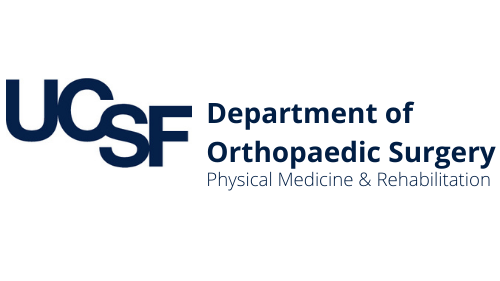
About this Course
The UCSF Ortho Physical Medicine and Rehabilitation Core provides educational content related to orthopaedic surgery and musculoskeletal medicine for Physical Medicine and Rehabilitation specialty.
Requirements
The UCSF Ortho Physical Medicine and Rehabilitation Core is meant to be an educational resource for medical trainees. Learners should be medical students or residents in training.
Course Staff
Faculty Contributor:
Dr. Karina Del Rosario,
Dr. Lisa Pascual,
Dr. Peter Wu



General Rehabilitation
Learning Objectives
1. Review the history of PM&R (Physiatry) as a medical specialty and career options in the field
2. Review common conditions Physiatrists treat and how
3. Understand the impact of rehabilitation on various pathologies such as spinal cord injury, stroke, amputee
Webinar Presentations
Physiatry Across Disciplines - Dr. Wu
Intro to PM&R Specialty Presented by Karina Del Rosario,MD
Rehabilitation Considerations for the Psychiatric Patient
- Additional Reading
-
Additional Reading
Kortebein, P., Bopp, MM., Granger, CV., et al. Outcomes of Inpatient Rehabilitation for Older Adults with Debility. American Journal of Physical Medicine & Rehabilitation. 2007. Click Here. Ries, AL., Bauldoff, GS., Casaburi, R., et al. Pulmonary Rehabilitation Joint ACCP/AACVPR Evidence-Based Clinical Practice Guidelines. CHEST Supplement. 2007. Click Here. Galloway, RV., Granger, CV., Karmarkar, AM., et al. The Uniform Data System for Medical Rehabilitation Report of Patients with Debility Discharged from Inpatient Rehabilitation Programs in 2000-2010. Am J Phys med Rehabil. 2013. Click Here. Lavie, CJ., Arena, R., Swift, DL., et al. Exercise and the Cardiovascular System: Clinical Science and Cardiovascular Outcomes. Circ Res. 2015. Click Here.
Hip
Recorded Lecture
Intervention for Hip Pain - Dr. Wu
Ultrasound and Intervention Techniques
Learning Objectives
Understand the topics of:
- Medications used in non-surgical interventions
- Relevant anatomy and indications for interventions
- Ultrasound guided injections
- Evidence for key procedures
Recorded Lecture
- Additional Reading
-
Additional Reading
Musculoskeletal Ultrasound Technical Guidelines. European Society of MusculoSkeletal Radiology. Click Here
Low Back Pain
Learning Objectives
- Understand the difference between specific and non-specific low back pain
- Know the common causes of non-specific low back pain
- Learn an evidence-based approach to selecting treatments for non-specific low back pain
Recorded Lecture
- Additional Reading
-
Additional Reading
Busanich BM, Verscheure SD. Does McKenzie Therapy Improve Outcomes for Back Pain? Journal of Athletic Training. 2006; 41(1):117-119. Click Here
Rundell SD, Davenport TE, Wagner T. Physical Therapist Management of Acute and Chronic Low Back Pain Using the World Health Organization's International Classification of Functioning, Disability and Health. Phys Ther. 2009; 89:82-90. Click Here.
van Middelkoop M, Rubinstein SM, Kuijpers T, et al. A systematic review on the effectiveness of physical and rehabilitation interventions for chronic non-specific low back pain. Eur Spine J. 2011;20(1):19-39. doi:10.1007/s00586-010-1518-3. Click Here
Qaseem A, Wilt TJ, McLean RM, Forciea MA, for the Clinical Guidelines Committee of the American College of Physicians. Noninvasive Treatments for Acute, Subacute, and Chronic Low Back Pain: A Clinical Practice Guideline From the American College of Physicians. Ann Intern Med. 2017;166(7):514. doi:10.7326/M16-2367 Click Here
Saal JA. Natural History and Nonoperative Treatment of Lumbar Disc Herniation. SPINE 1996; 21(24):25-95. Click Here
Demirel A, Yorubulut M, Ergun N. Regression of lumbar disc herniation by physiotherapy. Does non-surgical spinal decompression therapy make a difference? Double-blind randomized controlled trial. J Back Musculoskelet Rehabil. 2017;30(5):1015-1022. doi:10.3233/BMR-169581 Click Here
Knezevic, MD, PhD NN, Mandalia, DO S, Raasch, MD J, Knezevic, MD I, Candido KD. Treatment of chronic low back pain- new approaches on the horizon. J Pain Res. 2017;Volume 10:1111-1123. doi:10.2147/JPR.S132769 Click Here
?>
Neck Pain
Learning Objectives
1. Review PM&R subspecialties and their practice settings (inpatient vs. outpatient), emphasis (central dysfunction vs. peripheral dysfunction), and overlap with other specialties (e.g., Neurology, Anesthesiology, Orthopaedics)
2. Understand the epidemiology of common cervical disorders
3. Review medical history key points, physical examination, differential diagnoses, and multimodal therapeutic options for cervical spine disorders
Recorded Lecture
- Additional Reading
-
Additional Reading
Busanich BM, Verscheure SD. Does McKenzie Therapy Improve Outcomes for Back Pain? Journal of Athletic Training. 2006; 41(1):117-119. Click Here Rundell SD, Davenport TE, Wagner T. Physical Therapist Management of Acute and Chronic Low Back Pain Using the World Health Organization's International Classification of Functioning, Disability and Health. Phys Ther. 2009; 89:82-90. Click Here. van Middelkoop M, Rubinstein SM, Kuijpers T, et al. A systematic review on the effectiveness of physical and rehabilitation interventions for chronic non-specific low back pain. Eur Spine J. 2011;20(1):19-39. doi:10.1007/s00586-010-1518-3. Click Here Qaseem A, Wilt TJ, McLean RM, Forciea MA, for the Clinical Guidelines Committee of the American College of Physicians. Noninvasive Treatments for Acute, Subacute, and Chronic Low Back Pain: A Clinical Practice Guideline From the American College of Physicians. Ann Intern Med. 2017;166(7):514. doi:10.7326/M16-2367 Click Here Saal JA. Natural History and Nonoperative Treatment of Lumbar Disc Herniation. SPINE 1996; 21(24):25-95. Click Here Demirel A, Yorubulut M, Ergun N. Regression of lumbar disc herniation by physiotherapy. Does non-surgical spinal decompression therapy make a difference? Double-blind randomized controlled trial. J Back Musculoskelet Rehabil. 2017;30(5):1015-1022. doi:10.3233/BMR-169581 Click Here Knezevic, MD, PhD NN, Mandalia, DO S, Raasch, MD J, Knezevic, MD I, Candido KD. Treatment of chronic low back pain- new approaches on the horizon. J Pain Res. 2017;Volume 10:1111-1123. doi:10.2147/JPR.S132769 Click Here
Intervention Techniques
- Additional Reading
-
Additional Reading
1. Kaye AD, Manchikanti L, Abdi S, et al. Efficacy of Epidural Injections in Managing Chronic Spinal Pain: A Best Evidence Synthesis. Pain Physician. 2015, 18:E939-1004. Click Here
Anatomy and Pathology
- Additional Reading
-
Additional Resources
Additional Presentation
Pascual, LU. Spinal Cord Injury Presentation. Click Here
Additional Tool
International Standards for Neurological Classification of Spinal Cord Injury. Click Here
Additional Reading
Rabchevsky AG, Kitzman PH. Latest Approaches for the Treatment of Spasticity and Autonomic Dysreflexia in Chronic Spinal Cord Injury. Neurotherapeutics. 2011;8(2):274-282. doi:10.1007/s13311-011-0025-5. Click Here
Anatomy and Pathology
- Additional Reading
-
Additional Reading
Masel, BE., DeWitt, DS. Traumatic Brain Injury: A Disease Process, Not an Event. Journal of Neurotrauma. 2010. Click Here. Lemke, DM. Sympathetic Storming After Severe Traumatic Brain Injury. Critical Care Nurse. 2007. Click Here.
Concussion
Learning Objectives
- Understand the epidemiology and physiology of concussions
- Better understand acute management of concussion including recent updates and how to advise families
- Understand complexity in following concussion patients, appropriate referrals, and guiding return-to-sports and return-to-school
- Understand potential long-term sequelae of concussions
Recorded Lecture
Concussion & Management - Dr. Kapadia
- Additional Reading
-
Additional Reading
McCrory P, Meeuwisse W, Dvorak J, et al. Consensus statement on concussion in sport—the 5th international conference on concussion in sport held in Berlin, October 2016. Br J Sports Med. Published online April 26, 2017:bjsports-2017-097699. doi:10.1136/bjsports-2017-097699. Click Here
?>
Treatment
- Additional Reading
-
Additional Reading
Rosenfield, JV., Maas, A., Bragge, P., et al. Early Management of Severe Traumatic Brain Injury. Lancet. 2012. Click Here.
Mittenberg, W., Canyock, EM., Condit, D., Patton, C. Treatment of Post-Concussion Syndrome Following Mild Head Injury. Journal of Clinical and Experimental Neuropsychology. 2015. Click Here.
Giacino, JT., Whyte, J., Bagiella, E., et al. Placebo-Controlled Trial of Amantadine for Severe Traumatic Brain Injury. New England Journal of Medicine. 2012. Click Here.
Spasticity
- Additional Reading
-
Additional Reading
Chang E, Ghosh N, Yanni D, Lee S, Alexandru D, Mozaffar T. A Review of Spasticity Treatments: Pharmacological and Interventional Approaches. Crit Rev Phys Rehabil Med. 2013;25(1-2):11-22. doi:10.1615/CritRevPhysRehabilMed.2013007945. Click Here.
Sun L-C, Chen R, Fu C, et al. Efficacy and Safety of Botulinum Toxin Type A for Limb Spasticity after Stroke: A Meta-Analysis of Randomized Controlled Trials. BioMed Res Int. 2019;2019:1-17. doi:10.1155/2019/8329306. Click Here.
Rehabilitation
- Additional Reading
-
Additional Reading
Veerbeek JM, van Wegen E, van Peppen R, van der Wees PJ, et al. What is the Evidence for Physical Therapy Poststroke? A Systematic Review and Meta-Analysis. PLosONE. 2014, 9(2): e87987. Click Here.
Miller, EL., Murray, L., Richards, L., et al. Comprehensive Overview of Nursing and Interdisciplinary Rehabilitation Care of the Stroke Patient. American Health Association. 2010. Click Here.
Chollet, F., Tardy, J., Albucher, JF., et al. Fluoxetine for motor recovery after acute ischaemic stroke (FLAME): a randomised placebo-controlled trial. Lancet. 2011. Click Here.
Corbetta, D., Sirtori, V., Castellini, G., Moja, L., Gatti, R. Constraint-induced movement therapy for upper extremities in people with stroke (Review). Cochrane Database of Systematic Reviews. 2015. Click Here.
Kernan, WN., Ovbiagele, B., Black, HR., et al. Guidelines for the Prevention of Stroke in Patients With Stroke and Transient Ischemic Attack. American Health Association. 2014. Click Here.
Pang, MYC., Charlesworth, SA., Lau, RWK., Chung, RCK. Using Aerobic Exercise to Improve Health Outcomes and Quality of Life in Stroke: Evidence-Based Exercise Prescription Recommendations. Cerebrovasc Dis. 2013. Click Here.
Nerve Anatomy and Pathology
- Additional Reading
-
Additional Reading
Buschbacher RM, Prahlow ND. Manual of Nerve Conduction Studies Second Edition. Demos Medical Publishing. 2005. Click Here. Perotto AO. Anatomical Guide for the Electromyographer Fifth Edition. Charles C Thomas Publisher. 2011. Click Here. Robinson LR. How electrodiagnosis predicts clinical outcome of focal peripheral nerve lesions: Electrodiagnosis and Prognosis. Muscle Nerve. 2015;52(3):321-333. doi:10.1002/mus.24709 Click Here.
Electrodiagnostic Medicine
Learning Objectives
1. Provide an introduction to the purpose and procedure of EMG/NCS
2. Provide an introduction to neuromuscular disorder pathology and how EMG/NCS may be used to distinguish these
Recorded Lecture
- Additional Resources
-
Additional Resources
Additional Presentation
An Introduction to Electrodiagnostics: Electromyography and Nerve Conduction Studies. Presentation. Click Here.
Additional Tool
Neuromuscular Medicine Electrodiagnostics. Click Here.
Additional Reading
Preston DC, Shapiro BE. Electromyography and Neuromuscular Disorders: Clinical-Electrophysiologic Correlations. 3rd ed. Elsevier Saunders; 2013. Click Here
Mallik A. Nerve conduction studies: essentials and pitfalls in practice. J Neurol Neurosurg Psychiatry. 2005;76(suppl_2):ii23-ii31. doi:10.1136/jnnp.2005.069138. Click Here
Mills KR. The basics of electromyography. J Neurol Neurosurg Psychiatry. 2005;76(suppl_2):ii32-ii35. doi:10.1136/jnnp.2005.069211. Click Here
Haig, AJ., Talley, C., Grobler, LJ., et al. Paraspinal Mapping: Quantified Needle Electromyography in Lumbar Radiculopathy. Muscle & Nerve. 1993. Click Here.
Landau, ME., Campbell, WW. Clinical Features and Electrodiagnosis of Ulnar Neuropathies. Phys Med Rehabil Clin N Am. 2013. Click Here.
Van Eijk, JJJ., Groothuis JT., Van Alfen, N. Neuralgic Amyotrophy: An Update on Diagnosis, Pathophysiology, and Treatment. Muscle & Nerve. 2016. Click Here.
?>
Gait Analysis
- Additional Reading
-
Additional Reading
Daryabor, A., Arazpour, M., Aminian, G. Effect of Different Designs of Ankle-Foot Orthoses on Gait in Patients with Stroke: A Systematic Review. Gait & Posture. 2018. Click Here.
Prosthetics and Orthotics
- Additional Reading
-
Additional Reading
Medola, FO., Carril Elui, VM., Silva Santana CD., et al. Aspects of Manual Wheelchair Configuration Affecting Mobility: A Review. J. Phys. Ther. Sci. 2014. Click Here.
Vistamehr, A., Kautz, SA., Neptune, RR. The Influence of Solid Ankle-Foot-Orthoses on Forward Propulsion and Dynamic Balance in Healthy Adults During Walking. Clinc Biomech. 2014. Click Here.
Fatone, S., Hansen, AH. Effect of Ankle-Foot Orthosis on Roll-Over Shape in Adults with Hemiplegia. Journal of Rehabilitation Research & Development. 2007. Click Here.
Amputation
Recorded Lecture
Lower Extremity Amputation & Function - Dr. Pascual
- Additional Resources
-
Additional Resources
Additional Presentation
Pascual, LU. Lower Extremity Amputation and Function Presentation. Click Here
Additional Reading
Ulger, O., Sahan, TY., Celik, SE. A Systematic Literature Review of Physiotherapy and Rehabilitation Approaches to Lower-Limb Amputation. Physiotherapy Theory and Practice. 2018. Click Here.
Chadwick, SJD., Wolfe, JHN. Rehabilitation of the Amputee. ABC of Vascular Disease. BJM. 1992. Click Here.
Gailey, RS., Roach, KE., Applegate EB., Cho, B., et al. The Amputee Mobility Predictor: An Instrument to Assess Determinants of the Lower-Limb Amputee's Ability to Ambulate. Arch Phys Med Rehabil. 2002. Click Here.
?>
Cerebral Palsy
- Additional Resources
-
Additional Resources
Additional Presentation
Mitsuya, Y. Spasticity Management Presentation. Click Here. Mitsuya, Y. Cerebral Palsy Presentation. Click Here.
Additional Reading
Hoffer, M.M., Lehman, M., Mitani, M. Long-term Follow-up on Tendon Transfers to the Extensors of the Wrist and Fingers in Patients with Cerebral Palsy. Journal of Hand Surgery. 1986. Click Here. Hoffer, M.M., Zeltzew, S. Wrist Fusion in Cerebral Palsy. Journal of Hand Surgery. 1988. Click Here. Goldner, J.L. Koman, A., et al. Arthrodesis of the Metacarpophalangeai Joint of the Thumb in Children and Adults. Arthrodesis of the MCP Joint in CP. 1990. Click Here. Goldner, J.L. Surgical Reconstruction of the Upper Extremity in Cerebral Palsy. W.B. Saunders. 1988. Click Here. Rosenbsum, P.L., Walter, S., et al. Prognosis for Gross Motor Function in Cerebral Palsy: Creation of Motor Development Curves. JAMA. 2002. Click Here. Strecker, W.B., Emanuel, J.P. et al. Comparison of Pronator Tenotomy and Pronator Rerouting in Children with Spastic Cerebral Palsy. Journal of Hand Surgery. 1988. Click Here. Beach, W.R., Strecker, W.B., et al. Use of Green Transfer in Treatment of Patients with Spastic Cerebral Palsy: 17-year Experience. Journal of Pediatric Orthopaedicts. 1991. Click Here. Bleck. E.E. Management of Lower Extremities in Children Who Have Cerebral Palsy. J Bone Joint Surg Am. 1990. Click Here. Rosenbaum, P.L., Walter, S.D., et al. Prognosis for Gross Motor Function in Cerebral Palsy. JAMA. 2002. Click Here. Campos da Paz, Jr., A., Burnett, S.M., Braga, L.W. Walking Prognosis in Cerebral Palsy: A 22- Year Retrospective Analysis. Developmental Medicine and Child Neurology. 1994. Click Here. Renshaw, T.S., Green, K. et al. Cerebral Palsy: Orthopaedic Management. JBJS. 1995. Click Here. Koman, L.A., Sarllkiotis, T. Smith, B.P. Surgery of the Upper Extremity in Cerebral Palsy. Orthop Clin N Am. 2010. Click Here. Crichtron, J.U., Mackinnon, M. White, C.P. The Life-Expectancy of Person with Cerebral Palsy. Developmental Medicine and Child Neurology. 1995. Click Here. Barnes, M.J., Herring, J.A. Combined Split Anterior Tibial-Tendon Transfer and Intramuscular Lengthening of the Posterior Tibial Tendon. Results in Patients Who Have a Varus Deformity of the Foot Due to Spastic Cerebral Palsy. JBJS. 2010. Click Here. Kuban, K.C.K., Levron, A. Cerebral Palsy Medical Progress Review Article. New England Journal of Medicine. 1994. Click Here. Sala, D.A., Grant, A.D. Prognosis for Ambulation in Cerebral Palsy. Developmental Medicine and Child Neurology. 1995. Click Here.
- Ngo, M. Pediatric Rehabilitation Presentation. Click Here.
Spina Bifida
- Additional Resources
-
Additional Resources
Additional Presentation
Mitsuya, Y. Spina Bifida Presentation. Click Here.
Traumatic Brain Injury
Learning Objectives
- Understand the epidemiology and physiology of concussions
- Better understand acute management of concussion including recent updates and how to advise families
- Understand complexity in following concussion patients, appropriate referrals, and guiding return-to-sports and return-to-school
- Understand potential long-term sequelae of concussions
Recorded Lecture
Concussion & Management - Dr. Kapadia
- Additional Resources
-
Additional Resources
Additional Presentation
Ngo, M. Traumatic Brain Injury and Disorders of Consciousness Presentation. Click Here.
Additional Reading
Michaud, LJ., Duhaime, A-C., et al. Traumatic Brain Injury in Children. The Child with Developmental Disabilities. Pediatric Clinics of North America. 1993. Click Here
Duhaime, A-C., Christian, C.W., et al. Nonaccidental Head Injury in Infants- The “Shaken-Baby Syndrome.” New England Journal of Medicine. 1998. Click Here
?>
Neuromuscular Disease
- Additional Resources
-
Additional Resources
Additional Presentation
Mitsuya, Y. Autoimmune Encephalitis in Childhood Presentation. Click Here Ngo, M. Acute Flaccid Paralysis Presentation. Click Here
Gait Analysis
- Additional Resources
-
Additional Resources
Additional Presentation
Bartlett, A. Normal and Pathologic Gait in Children Presentation. Click Here
Spasticity
- Additional Reading
-
Additional Reading
McLaughlin, J. Bjornson, K. et al. Selective Dorsal Rhizotomy: Meta-Analysis of Three Randomized Controlled Trials. Developmental Medicine & Child Neurology. 2002. Click Here. King, W., Levin, R., et al., Prevalence of Reduced Bone Mass in Children and Adults with Spastic Quadriplegia. Developmental Medicine & Child Neurology. 2003. Click Here. Arens, LJ., Peucock, W.J., et al. Selective Posterior Rhizotomy: A Long-Term Follow-Up Study. Child’s Nerv Syst. 1989. Click Here. Peter, J.C., Arens, L.J. Selective Posterior Lumbosacral Rhizotomy in Teenagers and Young Adults with Spastic Cerebral Palsy. British Journal of Neurosurgery. 1994. Click Here. Vaughan, C.L. Berman, B. Peacock, W.J. A 3-Year Follow-Up Evaluation with Gait Analysis. Cerebral Palsy and Rhizotomy. J Neurosurg. 1991. Click Here. Sanger, T.D., Delgado, M.R., et al. Pediatrics- Classification and Definition of Disorders Causing Hypertonia in Childhood. American Academy of Pediatrics. 2011. Click Here. Albright, A.L., Barron, W.B., et al. Continuous Intrathecal Baclofen Infusion for Spasticity of Cerebral Origin. JAMA. 1993. Click Here. Thornetz, J.G., Tachdjian, M. Long-term Follow-up of the Flexor Carpi Ulnaris Transfer in Spastic Hemiplegic Children. Journal of Pediatric Orthopaedics. 1988. Click Here. Boscarino, L.F., Ounpuu, S., et al. Effects of Selective Dorsal Rhizotomy on Gait in Children with Cerebral Palsy. Journal of Pediatric Orthopaedics. 1993. Click Here.
Brachial Plexopathy
- Additional Reading
-
Additional Reading
Waters, PM. Obstetric Brachial Plexus Injuries: Evaluation and Management. J Am Acad Orthop Surg. 1997. Click Here. Eng, G.D., Binder, H., Getson, P. O’Donnel, R. Obstetrical Brachial Plexus Palsy (OBPP) Outcome with Conservative Management. Muscle & Nerve. 1996. Click Here Nelson, M.R., Tilbor, A.G. Birth Brachial Plexus Injury. Physical Medicine and Rehabilitation. 1995. Click Here. Shenaq, S.M., Berzin, E., et al. Brachial Plexus Birth Injuries and Current Management. Clinics in Plastic Surgery. 1998. Click Here. Pediatric DME and Therapy Articles. Butler, C., Okamoto, G.A., et al. Motorized Wheelchair Driving by Disabled Children. Physical Med Rehabil. 1984. Click Here. Willis, J.K., Morello, A., et al. Forced Use Treatment of Childhood Hemiparesis. Pediatrics. 2002. Click Here. Molinar, G.E. A Developmental Perspective for the Rehabilitation of Children with Physical Disability. Pediatric Annals. 1988. Click Here.
Durable Medical Equipment and Therapy
- Additional Reading
-
Additional Reading
Butler, C., Okamoto, GA., McKay, TM. Motorized Wheelchair Driving by Disabled Children. Arch Phys Med Rehabil. 1984. Click Here. Willis, JK., Morello, A., Davie, A., et al. Forced Use Treatment of Childhood Hemiparesis. Pediatrics. 2002. Click Here. Molnar, GE. A Developmental Perspective for the Rehabilitation of Children with Physical Disability. Pediatric Annals. 1988. Click Here.
Applied Ontologies
Recorded Lecture
Pediatric PM&R & Medical Research and Applied Ontologies - Christine Aguilar, MD & Regina Hurley, PhD - 3.17.21
Fragility Fracture
Learning Objectives
Fall Prevention Strategies - Karina Del Rosario, MD
- What are the risk factors for falls
- What are the evidence based interventions that can prevent falls
Exercises: are they effective? - Masato Nagao, MD, PhD
- What are the benefits of exercise in the elderly
- What are examples of safe exercises in the elderly
Post-fracture protocols: are they different for the elderly - Lisa Pascual, MD
- Review the fracture protocols for the elderly in the literature
- Review the epidemiology of hip fractures
Recorded Lecture
Fragility Fracture Prevention and Rehabilitation: What are the Strategies?
Osteoarthritis
- Additional Resources
-
Additional Reading
Zhang, W., Moskowitz, RW., Nuki, MB., Abramson, S., et al. OARSI Recommendations for the Management of Hip and Knee Osteoarthritis, Part II: OARSI Evidence-Based, Expert Consensus Guidelines. Osteoarthritis and Cartilage. 2008. Click Here. Fernandes, L., Hagen, KB., Bijlsma, JWJ., Anreassen, O., et al. EULAR Recommendations for the Non-Pharmacological Core Management of Hip and Knee Osteoarthritis. Ann Rheum Dis. 2013. Click Here. Bannuru, RR., Osani, MC., Vaysbrot, EE., et al. OARSI Guidelines for the Non-Surgical Management of Knee, Hip, and Polyarticular Osteoarthritis. Osteoarthritis and Cartilage. 2019. Click Here.